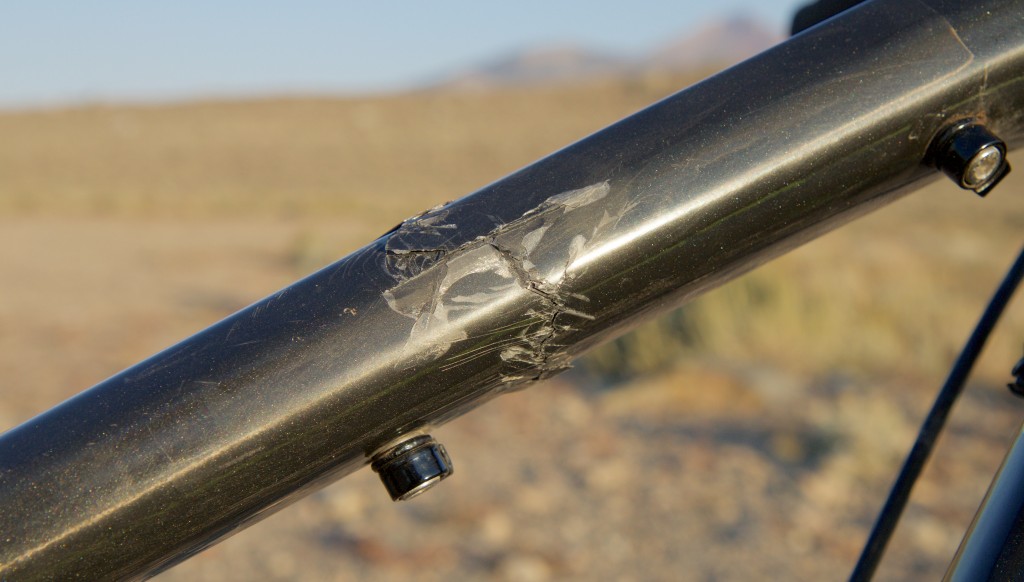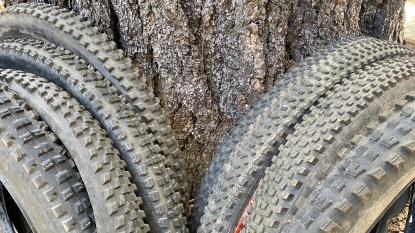Is Carbon Worth the Upgrade?
There are many options for upgrades, from less costly upgrades like a new handlebar or seat to more expensive upgrades such as replacing your wheels or switching your drivetrain from 2x10 to 1x11. Most upgrades are born from the idea that less weight is better, and we tend to agree as long as it doesn't come at the cost of performance. There are some components that you can replace with top-ranked bike gear to lighten your rig, but what about the frame? We feel that most bike owners out there will do a full upgrade in the form of a completely new bike, but there are riders out there that will replace just a frame. This article will speak to both groups of riders about whether upgrading to a carbon frame or upgrading from an aluminum bike to a new carbon bike is worth the cost.
The Myth
When carbon debuted in the mountain bike world in the 90s, there was a collective gasp and overwhelming feeling that "these bikes are going to break!" That may have been true initially, but it is no longer the case. We've moved from the "lightest carbon frame possible" mentality to "the best carbon frame possible." With a switch of focus from light to durable and building carbon frames to withstand the abuses of a specific genre, we've seen carbon become nearly ubiquitous in all forms of cycling as the material of the pros. While a carbon frame built for cross-country riding may not hold up as well as one built for downhill, the lightness of the cross-country frame is more important, while the durability of the downhill frame is a more significant asset.
In truth, if we tested the strength of the same frame built from carbon and aluminum, you would see that carbon fiber frames are much stronger per pound in terms of both stress tests and impact tests.
Weight vs Price
One of the most discussed aspects of carbon fiber frames is the weight savings over aluminum frames. It is hard to pin down a hard and fast rule about how much lighter a carbon frame is compared to an aluminum one. For example, a Santa Cruz Bronson carbon frame may boast a 1.5-pound weight saving over the aluminum version, while the carbon Pivot Switchblade might be 1.9 pounds lighter than the aluminum Switchblade.
Then comes the elephant in the room — cost. Carbon fiber tends to be much pricier than aluminum-framed models. This begs the obvious question, is a 1.5-pound weight saving worth the extra cash? That, of course, is a personal question that depends on your goals and finances. It should be noted that component upgrades save weight as well. Even if you have a chunky aluminum frame, it is easy to save a pound or two with the components on the bike.
Remember, having a slightly heavier bike isn't a big deal. Fitness and skill are far more important than bicycle weight.
Feel
The feel of carbon is superior to aluminum and may be worth the upgrade cost in itself. Two major benefits of a carbon frame over an aluminum one are dampening and torsional stiffness.
- Damping: A carbon frame has a damping effect, lowering the ride's harshness. Aluminum is a stiffer material and transfers much more of the trail, including rocks and roots, into your hands and behind. While minimal, the dampening effect of carbon will take some of the harshnesses out of the ride by soaking up some of the chatter you get when riding a rough trail. However minimal, this effect will give your hands and butt an amount of respite not offered by an aluminum frame. When multiplied over hours of riding, the effect multiplies, and we find that we can ride comfortably for a longer period on a carbon bike. While dampening is real and does smooth out the ride, we feel that there may be a placebo effect of carbon that makes it feel much smoother than it is, and we tend to feel faster because of this. This could also be attributed to a lighter weight as well. Whether these exaggerated benefits are part of the mindset of slaying on a carbon bike or not, we're 100% confident that we ride faster on a carbon bike. We especially notice this "carbon comfort" factor at the end of a super long mountain bike ride. If you don't choose to go the carbon frame route, carbon handlebars and a carbon seat post will give you some dampening and soften the ride and also lighten your bike at the same time.
- Torsional Stiffness: While dampening can soften the ride, it is by no means at the cost of pedal power. The bike will rock to the side when you push down on a pedal, especially in a standing position. With a carbon frame built correctly, the torsional stiffness will transfer all that power into your rear wheel. (Carbon is a grained material, meaning that the placement direction of the grain is important.) Although both frame materials flex a bit, carbon frames tend to be torsionally stiffer, preventing your bottom bracket from twisting about the chainstay and down tube, creating a snappier ride. Accelerating on a carbon bike feels much snappier due to both the torsional stiffness and lighter weight. Although minimal, that snappiness will affect your performance and psyche, leading to faster times and more confidence.
Durability
The myth that carbon is fragile again rears its ugly head, but it is just a myth. While both frame materials are susceptible to catastrophic failure, carbon fiber frames tend to be stronger per pound than aluminum equivalents. We see a lot of pictures of broken carbon frames pasted into forums to try and show how fragile carbon is, but it's just not the case. We don't know if these people have ties to aluminum investments or if they hold on to ancient beliefs about carbon, but we know that carbon frames are stronger and lighter than aluminum.
Aluminum is great because it's cheap, fairly light, and fairly stiff. The problem is that with stiffness comes stress fracturing. Carbon has the dampening effect that soaks up repeated abuse and allows it to spring back into place, while aluminum eats each impact. After thousands of miles, these impacts add up to many microscopic cracks in the aluminum, and over time stress failure cracks will appear, typically at the wades, the weakest points. Fatigue cracks will lessen the strength of the frame and will also reduce its stiffness, eventually causing failure. While this certainly won't occur overnight, you should be aware.
On the other hand, besides being better over time, carbon has a much higher tolerance to frame bending. If you were to run your favorite bike straight into a wall or rock or a double where the impact is directed straight through the frame, the impact on the front wheel would push through the fork and into the head tube. The force on the head tube is translated as if you were trying to fold the front wheel back towards the bottom bracket, bending the down tube where it connects to the head tube. On a carbon bike, the catastrophic failure point is much higher than on an aluminum bike due to the flex qualities of the carbon material. Just as one impact of this nature could break an aluminum frame and not a carbon frame, repeated stresses would also cause an aluminum frame to break sooner.
Carbon is also said to splinter on impact, while aluminum will survive the same impact. While both frames have their breaking points, typically, carbon will "bounce" off a rock due to those same dampening qualities we addressed earlier, while an aluminum frame will tend to absorb more of that impact, sometimes in the form of a dent. There isn't much information regarding specific impact forces, and we weren't allowed to take an axe to the top tubes of any of the bikes. Still, we don't feel carbon is less susceptible to impact breakage than aluminum and possibly more resistant. Regardless, carbon is repairable, while aluminum is not so much.
That being said, we did manage to break a carbon frame during our test period, so we know that it is not invincible. The force of a big crash can damage any bike. Would an aluminum bike have survived when this carbon frame splintered? We don't know for sure. Would we resort to only buying aluminum frames because of this? Nope. We are still fans of carbon.
Not all carbon is not created equal, so be judicial in your purchase decision, especially if the price for that carbon bike is lower than you'd expect. Manufacturing practices go a long way in determining the quality of your ride, regardless of material, and we recommend bikes built by reputable companies with solid warranties.
Lifespan
As technology changes so quickly in the modern era of mountain biking, we don't know how much lifespan will affect your choice because either material will give you a solid 7-10 years of life. Still, carbon is the way to go if you want to buy a bike that will last. Impacts and abuse aside, carbon doesn't fatigue over time, and your frame will be as good in 20 years as it was the day you bought it, although heckling will probably increase, as might your belly.
Other Materials
Other materials out there have stood the test of time, namely steel and titanium. We've seen both disappear for various reasons, steel being much too heavy and titanium being too expensive and still heavier than carbon. There are uses for both, often custom-built frames for riders of unusual size (ROUS's). titanium, for instance, is extremely compliant and stiff. When building a bike for a very tall rider, you can't simply make a frame bigger; it has to be designed for that rider, or the rider's forces will negatively impact the frame. Titanium is very stiff. Building a bike for a taller or heavier rider allows the builder to keep the same design as a smaller bike without compromise.
Conclusion
There are many choices out there, but we are all firm believers in the power of carbon. While it may lighten your wallet, it will also lighten your ride. We think the cost difference is negligible compared to the performance boost and weight savings. It's not just a matter of being lighter, it's a matter of stronger and better ride characteristics, and we think if you have the means to afford a carbon bike, do it. Check out our best trail mountain bikes article to see what carbon bikes we love. If you can't afford the jump, don't be disillusioned — there are many bikes we love riding with aluminum frames. See our best budget mountain bike review to find out what we rate best.









